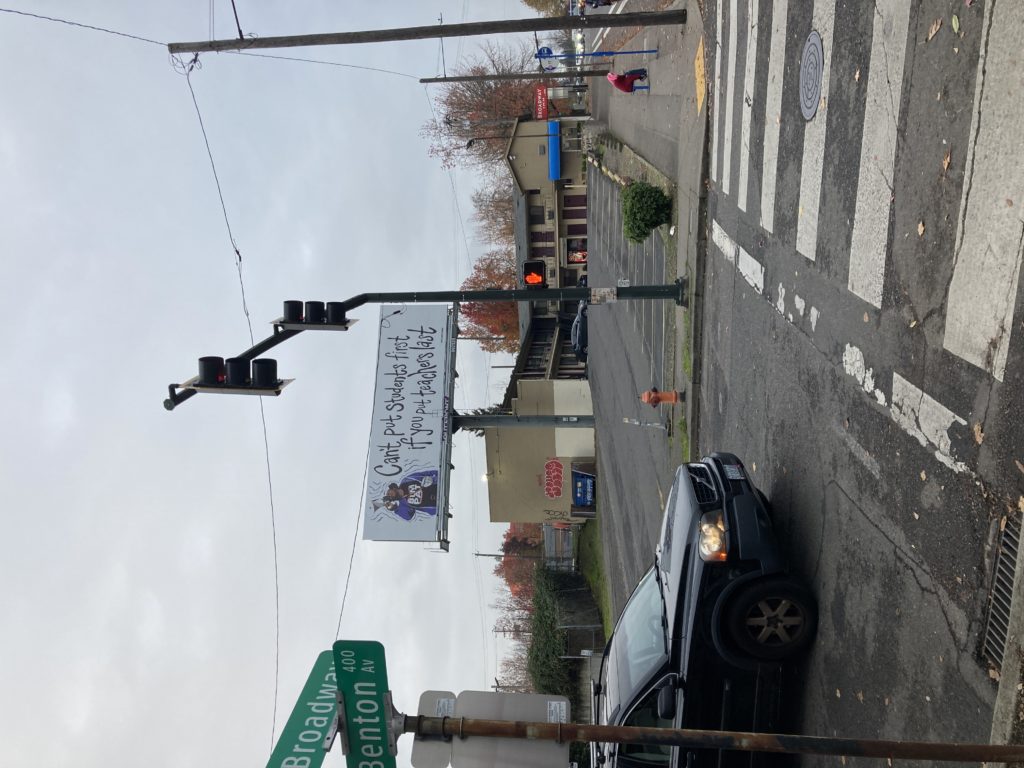
As the Portland Public Schools’ (PPS) teacher strike drags on, I find myself wondering who deserves the majority of the blame. Who’s at fault for all the missed club meetings, all the nonexistent classroom conversations and unlearned curriculum? Who’s at fault for this indefinite closure of schools that is eerily reminiscent of the earliest days of the COVID-19 pandemic?
I certainly don’t think it’s the teachers. Their hard work has too often been taken for granted, and it’s only worsened since the pandemic. Student behavioral and mental health issues exacerbated by the pandemic have forced many teachers to shoulder increasingly heavier burdens in order to meet students’ increased needs — all while getting less bang for their buck as a result of rampant inflation. They deserve better pay, reasonable class sizes and a safe classroom environment. No educator or student should ever have to worry about rats in their hallways and massive temperature fluctuations in their classroom.
PPS certainly should be blamed here; when given the choice, the district has consistently chosen to increase spending on administration instead of educators. The past 5 years have seen a 38% increase in the number of central office professionals, a 17% increase in administrative staff and a 4% decrease in licensed staff such as teachers and counselors.
I’ve experienced this bureaucracy firsthand, both as an everyday student and as a Grant Magazine reporter and editor. Simple questions or inquiries sent by email can turn into a wild goose chase involving referrals to various district officials. Personally, I find PPS’s lack of investment in their educators bewildering. It is teachers that are directly responsible for student’s education; if their needs aren’t being met, there’s absolutely no way the students’ can be.
PPS claims they don’t have the money necessary to fund a contract that addresses all of the Portland Association of Teachers’ demands without making deep cuts into other areas of their budget in a way that would impact students. I personally find this claim dubious; cutting administrator pay, central office spending & eliminating weekly required staff meetings for example would likely have negligible impacts on students. Either way, supporting teachers should be the first financial priority of any system of education, because without teachers there can be no education. Any budget cuts necessary to provide teachers with a fair contract is money that should’ve already been going towards supporting educators if the district had its priorities straight.
This isn’t to suggest that any potential budget cuts couldn’t have a negative impact on students. If PPS is actually being truthful about the extent of its financial resources, a fair contract for educators may necessitate cuts to other areas that provide direct support to students. However, that burden shouldn’t continue to be placed on educators’ shoulders. They are not responsible for the finances of our school system, and they shouldn’t be asked to keep sacrificing their time and well-being for it. They simply have no more to give.
However, PPS isn’t the only entity to blame for this strike. Making sure Oregon’s public schools have enough money to adequately meet the needs of both educators and students is not the responsibility of teachers but it’s also not the responsibility of individual school districts. Public school funding is the responsibility of only one group: the state government. And they’re failing miserably at it.
Oregon’s government has an almost-laughable inability to adequately fund its public schools. According to the state’s own Quality Education Model (QEM), an allocation of $11.889 billion dollars for the State School Fund is what was needed to properly fund Oregon’s public schools during the 2023–2025 budget cycle. Instead, the state initially allocated only $9.9 billion, raising it slightly to $10.2 billion after protests that the money was insufficient.
This isn’t a new development; since at least 1999, the state has consistently allocated less to the State School Fund (the pool of money that funds Oregon’s public schools) than the QEM recommends. However, this budget cycle’s allocation is especially disturbing when you take into consideration the state’s kicker tax.
The kicker tax was first established by the state legislature in 1979 and then enacted into the state constitution by voters in 2000. Whenever the state’s biennial (two-year) revenue is 2% or higher than what state economists predicted at the start of the budget cycle, the kicker tax returns all that extra money to Oregon taxpayers as a rebate on their income taxes. This year, Oregonians are set to receive a record return, with the state’s kicker tax being calculated at a staggering $5.61 billion dollars.
In theory, the kicker tax is a good way of distributing unneeded money back to the taxpayers. However, it is fiscally irresponsible for a state to return revenue when essential services like education are in desperate need of additional funding. According to the U.S. News and World Report, Oregon’s public pre-K-12 school system is currently ranked 42nd out of all 50 states. People like to say children are the future, but if Oregon continues to neglect the system designed to illuminate their minds, it’s hard to see how the future will be anything but pitch-black.
Oregon taxpayers can donate their kicker tax rebate to the State School Fund when they file their tax return. If it’s feasible for you financially, I’d highly encourage you to do so. If you don’t pay Oregon taxes, ask someone you know if they will donate their tax rebate. The more money that’s in that fund, the harder it becomes for PPS to use the fear of budget cuts to continue refusing to invest in our teachers and schools.
However, this will not be enough. After Portland teachers win a fair contract, Oregonians need to come together and demand the state legislature send an amendment to voters to modify the kicker tax, ensuring any extra revenue is first used to properly fund public education before being redistributed to taxpayers. The state also needs to step up and actually start giving Oregon public schools the money the QEM says they need. PPS and the state can no longer be allowed to continue disinvesting in our educators and students.
The current PPS teacher’s strike didn’t occur in a vacuum. If the long-standing systemic issues that led to this point are to be addressed, both PPS and our state government need to take a long, hard look in the mirror and reassess their priorities. They need to figure out how to put teachers and students before administration and kicker taxes.
Our educators and the students they serve deserve to have the people in power give a damn about them. We won’t settle for less.



